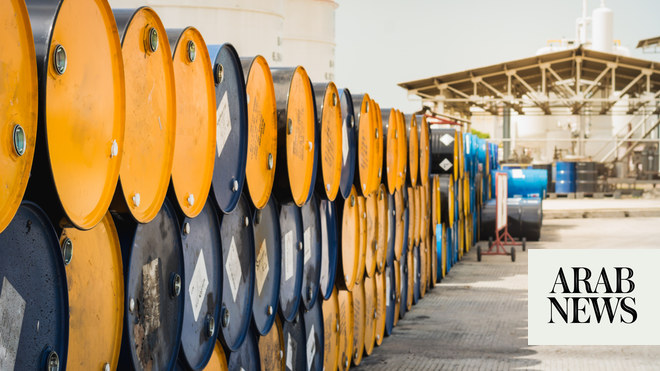
SINGAPORE: Oil prices steadied on Tuesday after falling for the past two sessions, as investors remained cautious amidst expectations of plentiful supplies and weak demand, while brushing off the US presidential campaign upheaval, according to Reuters.
Brent crude futures for September rose 11 cents to $82.51 a barrel by 09:45 a.m. Saudi time. US West Texas Intermediate crude for September climbed 5 cents to $78.45 per barrel.
Traders mostly ignored US President Joe Biden’s decision to call off his reelection bid and endorse Vice President Kamala Harris on Sunday. Citi analysts said they believed neither Harris nor Republican nominee Donald Trump would promote policies that would greatly affect oil and gas operations.
Instead, the market focused on fundamentals, which Morgan Stanley analysts said were likely to balance out by the fourth quarter and rise to a supply surplus by next year, which would drag down Brent prices to the mid-to-high $70s per barrel range.
Any uptick in oil prices was more because of market consolidation and dip buying activity, said Priyanka Sachdeva, senior market analyst at Phillip Nova.
“Any further weakening of demand signals, combined with a resolution in Gaza, could lead to a further decrease in oil prices,” Sachdeva said, adding that a swell in US inventories last week would be a sign of dented demand.
The American Petroleum Institute, a trade group, is due to release its estimates for last week’s oil inventories on Tuesday, while official US government data is scheduled to land on Wednesday.
A preliminary Reuters poll of six analysts estimated that US crude stocks, on average, fell by 2.5 million barrels in the week to July 19, while gasoline stocks likely dropped by 500,000 barrels.
The market is also watching developments in Russia. The Tuapse oil refinery, its biggest on the Black Sea, was damaged in a major Ukrainian drone attack that sparked a fire, Russian officials said on Monday, though the extent of the damage was not immediately clear.
“Further strikes on Russian refinery capacity would support refined product prices, due to lower output, and somewhat bearish for crude oil, as it would increase availability of crude oil for export,” said ING market strategists in a note.












